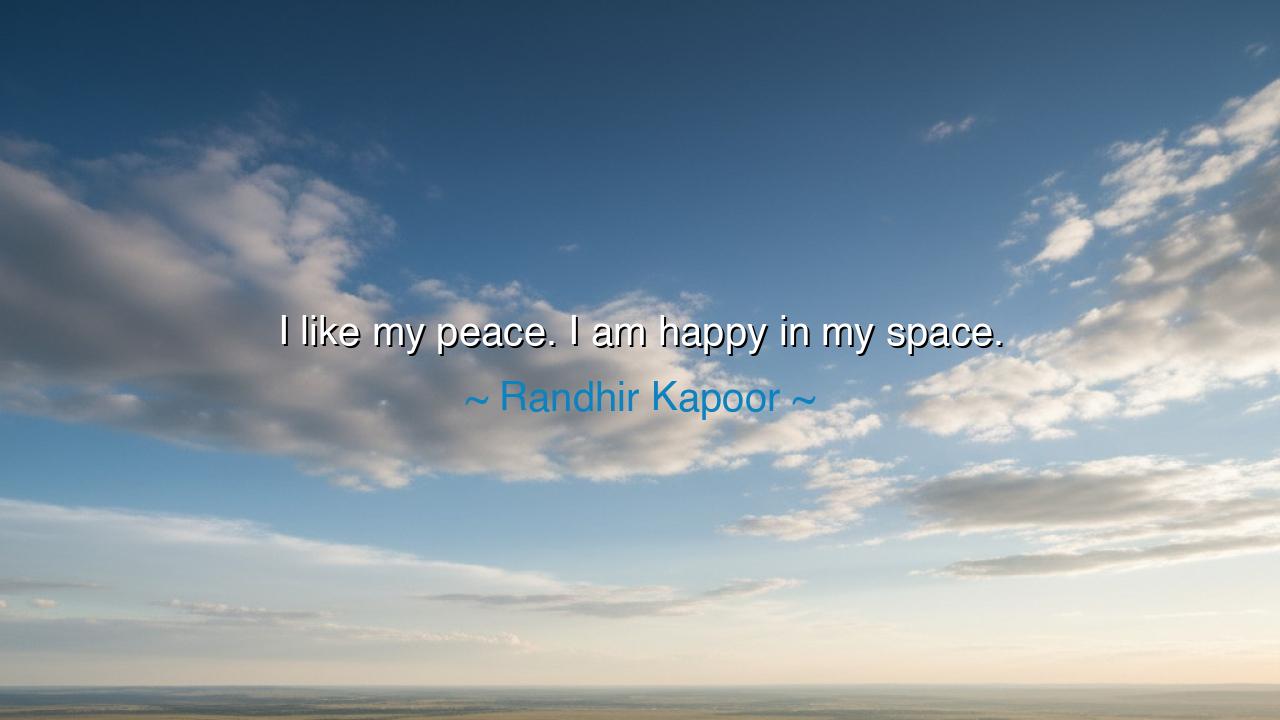
I like my peace. I am happy in my space.






Hear, O children of wisdom, the words of Randhir Kapoor, a man who has known the hustle and bustle of the world, yet has also learned the value of quietude. He spoke thus: "I like my peace. I am happy in my space." These words are not merely a reflection of personal preference, but a profound declaration of the need for inner peace and the importance of creating space for tranquility in the face of life's constant demands. In an age where the world seems to rush forward, ever faster, ever more demanding, Kapoor’s words resonate as a reminder that peace is a choice, one that is worth protecting.
In this statement, Kapoor teaches us a profound truth: to find happiness, we must first create a sanctuary of peace within our own lives. Peace is not a passive state, nor is it something that can be easily attained from external circumstances alone. It is a force we must cultivate, like a gardener tending to a delicate flower, ensuring that it is nurtured and protected from the storms of life. In our pursuit of greatness, success, and the external recognition that so many seek, we must not forget the value of inner quietude — the space that allows us to breathe, reflect, and reconnect with the deeper currents of our being.
Consider the life of Gautama Buddha, who, after years of seeking answers through external means, came to understand that peace comes not from the outside world, but from the stillness within. Buddha, in his search for enlightenment, withdrew from the noise of life and embraced solitude. It was in the quiet of meditation, in the space he created for himself away from the chaos of society, that he found the clarity and wisdom that would lead him to enlightenment. His journey was one of inner peace, where he sought not the accolades of kings or the possessions of merchants, but the serenity that comes from knowing oneself and embracing the peace that resides in the depths of the soul.
This idea of peace and space is also seen in the example of Leonardo da Vinci, a man whose genius was unparalleled in his time. Yet, even as he created masterpieces of art and science, Leonardo understood the importance of personal space and peace. He would often retreat from the chaos of court life, finding solace in the quietude of nature or in the solitude of his study. It was in these moments of peaceful retreat that his creativity flourished, that his ideas came to him in their purest form. Leonardo’s life teaches us that true brilliance, true creativity, and true happiness arise not from the external noise, but from the inner peace that allows us to hear our own thoughts clearly.
In a world that often tells us that achievement, recognition, and acquisition are the paths to happiness, Randhir Kapoor’s words are a gentle, yet powerful, reminder: True happiness lies not in the pursuit of endless external goals, but in the ability to find peace in one’s own space. Whether that space is a room, a moment of solitude, or a quiet corner of the mind, it is in these moments of personal retreat that we can connect most deeply with ourselves. We are not defined by the noise of the world, but by our ability to find peace within it.
The lesson here is clear: Seek peace, not only in the moments of quiet, but in the spaces you create for yourself within your daily life. We live in a world that constantly demands our attention, that seeks to fill every moment with noise, with distractions, and with obligations. Yet, to truly live fully, to find happiness, we must create space for ourselves, space where we can simply be. Peace is not a luxury reserved for the wise or the secluded, but a necessity for all who seek to find balance in the chaos of the world.
And so, O children of wisdom, let us learn from the words of Randhir Kapoor. In our quest for success, let us not lose sight of the peace that is ours to claim. In the rush to achieve, take moments to pause, to reflect, and to cultivate a space of quiet in your life. Whether it is through moments of solitude, through reflection, or through connecting with the beauty of nature, let these moments be the wellspring from which your strength and happiness flow. In your peace, you will find clarity, creativity, and a profound joy that no external achievement can provide. Protect your space, nurture your peace, and in that quiet sanctuary, you will find the true richness of life.






AAdministratorAdministrator
Welcome, honored guests. Please leave a comment, we will respond soon